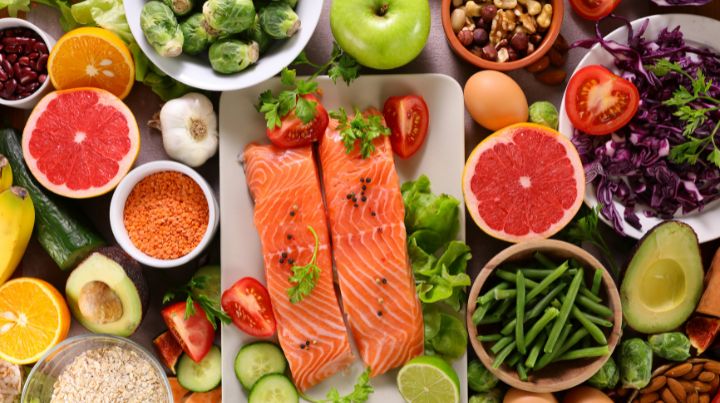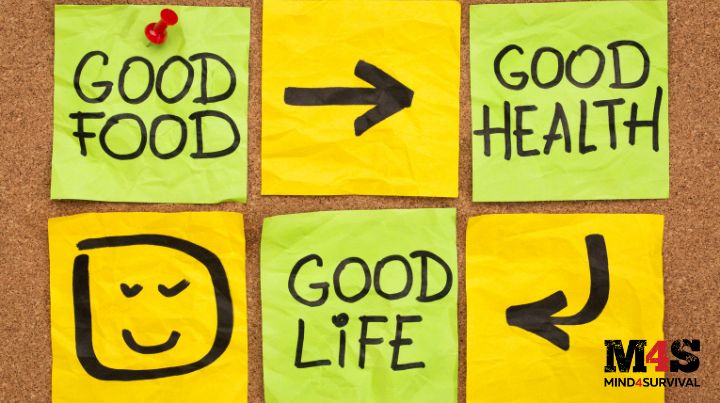169: Diet-Specific Survival (What You Need to Know)


Podcast: Play in new window | Download
Hey there, survival enthusiasts! Today, we're diving into a topic that's often overlooked but is super important—diet-specific survival. You know, the kind of survival that takes into account your unique dietary needs. “Unique dietary needs” isn't about losing weight; it's about staying alive and well when the chips are down. So, let's get into it!
Note: This article and podcast episode are based on the article “Diet-Specific Survival” from the August 2023 issue of the “Prepper Survival Guide.” The 112+ page Prepper Survival Guide can be found in many retail stores' magazine racks, and at $12.99 is an incredible deal. This is classified as a magazine—it's really a how-to book on various prepping topics. Get your copy today!
Why It's Not Just About Calories
You might think that in a survival situation, any food is good food. But that's a dangerous misconception. The reality is, if you have specific dietary needs, you can't just “suck it up” and eat whatever's available. That could lead to serious health problems or worse. Preparedness is about planning for the future, and that includes your diet-specific needs.
Community Matters
Survival isn't a solo sport. It's about community. Whether it's you and your spouse, your family, or a larger group, you need people around you. Why? Because if you twist an ankle or get sick, you will need help. And let's face it, overall, life is much more safe and secure when you're not alone. And, when it comes to community, many members of your community will have dietary needs and constraints that must be addressed. If not, they will struggle, and some may die.

Food and the Survival Pyramid
In the world of survival preparedness, food is one of the key ingredients of the survival pyramid. In addition to food (nutrition), mindset, situational awareness, immediate action, oxygen to the brain, shelter, water & sleep, and community make up the requirements of life. As such, without any of those, and in the case of this article, when it comes to food, you can't live without it.
Special Dietary Needs
When it comes to survival food for those with special dietary needs, the game changes. You need foods that are specific to your needs. Some people need foods that are low in sugar and salt. Others may live and operate better with organic options. And let's not snicker at the word ‘organic.' For some people, eating non-organic foods can lead to health issues, feeling ill, and subpar performance, which is anything other than desirable in a survival situation.
Medical Conditions and Allergies

If you have a medical condition or allergy, your diet isn't just a preference; it's a necessity. For example, people with diabetes can't just eat a bucket of rice without it taking a toll on their glucose levels. Similarly, if you're gluten-sensitive, eating gluten could lead to painful conditions like diarrhea and nausea, which are the last things you need in a survival situation.
Planning Ahead
The key to diet-specific survival is planning (aka preparedness). If you have type 2 diabetes, beans may be a better option for you than rice. If you're gluten-sensitive, consider avoiding pasta rather than stockpiling it. Likewise, if you have a problem with sodium, avoiding many mass-produced, freeze-dried foods is the best course of action.
Ultimately, you need to think about these things (see situational awareness) now to avoid getting caught off guard later. After all, the health and survival of you and your family depend on it!
The Bottom Line on Diet-Specific Survival
Survival during difficult times is, at best, a struggle. However, it's even more challenging if you're not adequately prepared. And part of being prepared is thinking about you and your dietary limitations. So, take the time now to plan for your specific needs. Trust me, your future self will thank you.
What are your thoughts on diet-specific prepping? Do you or a loved one have diet-specific needs? What do you do to manage those needs? Tell us in the comments below.
Additional Resources:
- Harvest Right Freeze Dryer: A Preparedness Must-Have!
- Best Foods to Stockpile for an Emergency Food Supply
- Natural Disaster Food: Eat Healthy During an Emergency
- 2 Weeks of Food: How to Start a Stockpile for New Preppers
Stay safe,

Related Articles
FREE Guide
Read the Best Seller
Join Mind4Survival
Stay informed by joining the Mind4Survival! 100% Secure! 0% Spam!
Affiliate Disclosure...
Mind4Survival is a free, reader supported information resource. If you make a purchase through our link, we may, at no cost to your, receive an affiliate commission.
Do You Want To Be Ready No Matter What?

Download our free 39-page guide with interactive, 7-Day Emergency Kit Checklist and take the first step toward real preparedness.
- Know exactly where to start.
- Save time and money.
- How-to build a complete Basic Emergency Kit.
- Level up your safety and security.
Join Mind4Survival
Stay informed by joining the Mind4Survival! 100% Secure! 0% Spam!






Preparedness for those with dietary limitations requires careful attention. We plan for two situations: preparing to shelter in place, and preparing for evacuations. Shelter in place is easier as you can generally obtain shelf stable suitable foods that will meet your requirements and store them at home. They should be foods you can rotate and use. Evacuation is more complex in that you need the carry suitable foods with you as well as a means to prepare and cook those foods. Should you be caught away from home during an evacuation, you need to have the food basics in your vehicle that cover a few days. And you need to know what foods are safe for you or the family member to eat and how to prepare them wherever you might be. Portable refrigeration may also be a need. You must be prepared because mass evacuation situations will not often take into account any special dietary needs of evacuees. In these situations, knowledge is empowerment.
Excellent comment!🙏 Thanks for your feedback and input!
As a diabetic (Type 2, insulin resistant diabetes) it is VERY difficult for me to find foods that are ok for me. Rice is definitely out, as are almost all beans, lentils, quinoa, …..
Even after 10 years of having this, I am still having trouble finding a way to control my glucose levels with 2 medications.
I tried KETO, but never once went into ketosis, and it gave me thyroid issues along with elevated cholesterol…something that, upon searching, KETO is not advised for women, especially as it tends to do just what happened to me. Also, intermittent fasting is not recommended as well as it contributes to those issues.
Sorry, off topic.
So, for me it is meat, eggs, most vegetables except root vegetables, and fruits like berries. Mostly the first 3. So, I have to either freeze dry (I bought one to make my own ‘survival’ meals similar to Mountain House, but geared toward my medical needs), dehydrate and can. Freezing, in my opinion is not a viable emergency method as power can be iffy, and to loose an entire freezer full of meat is VERY expensive (I had it happen twice.) The first time I lost over $1500. in meat.
I have been finding alternatives to pastas and found some that aren’t too bad. I will stock black beans, garbanzos, lentils, even though they aren’t great for me.
This topic has not been written about in the prepping community, and some even go so far as to say I shouldn’t be concerned about it, and just prep like everyone else. In other words, they don’t think carbs are problems. Either that, or they honestly don’t even think about people like me with T2D, or care about our specific needs. My daughter is gluten intolerant, (although I have tried to explain that ancient grains, ones that have never been modified or hybridized, and/or sourdough all are much more digestible than wheat grown today and shouldn’t cause issues)…she has just had too much pain involved when she ingests something with gluten.
Knowing what you can and can’t eat, makes it helpful when planning your pantry. Just stock up on those items you CAN eat, and maybe a few of the kind you shouldn’t for bartering, and preserve them for emergencies.